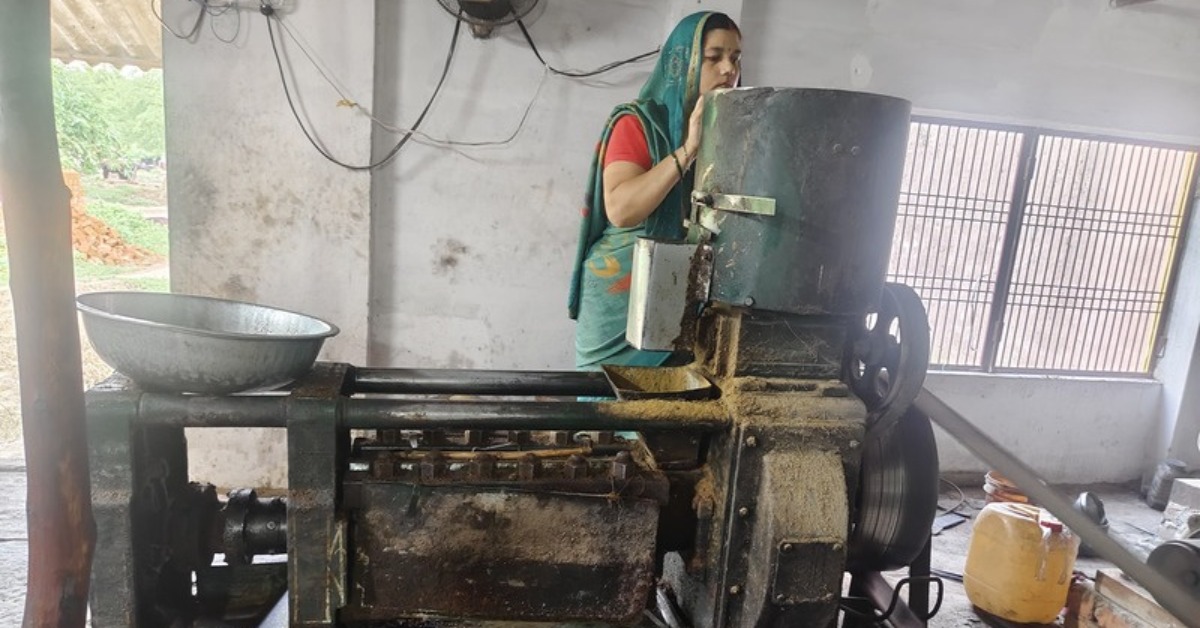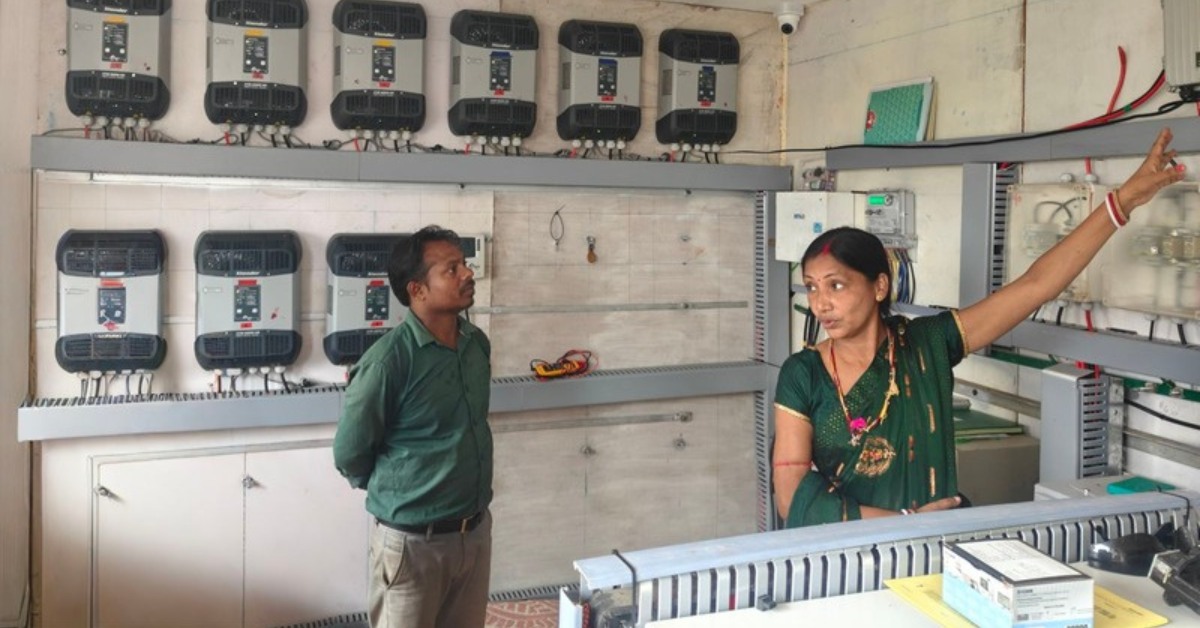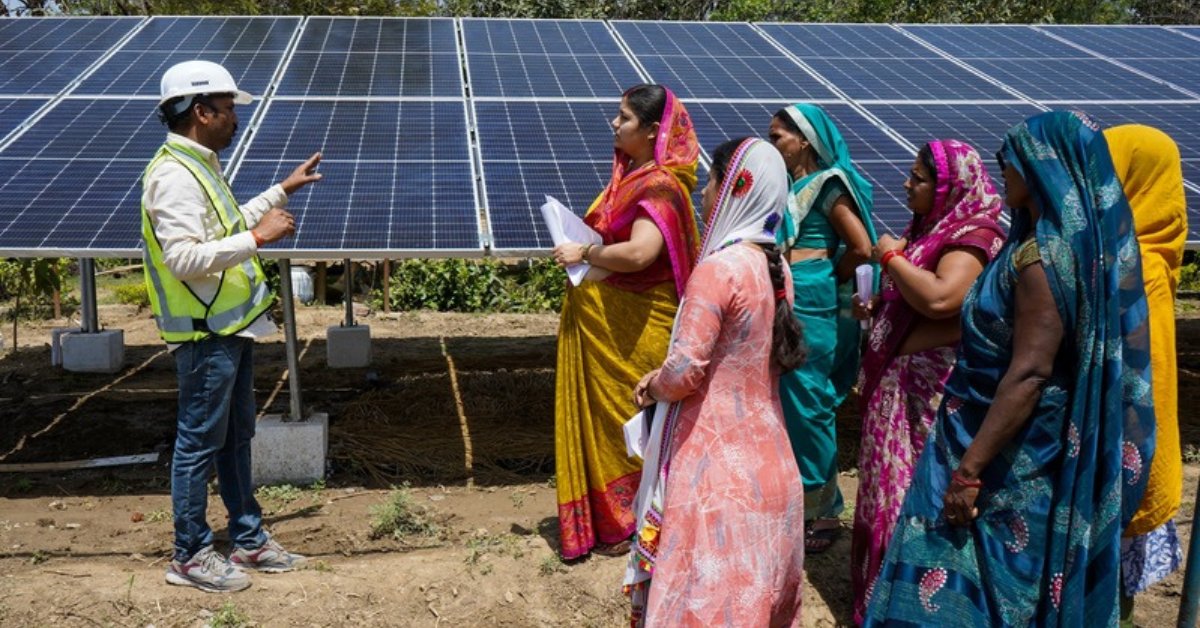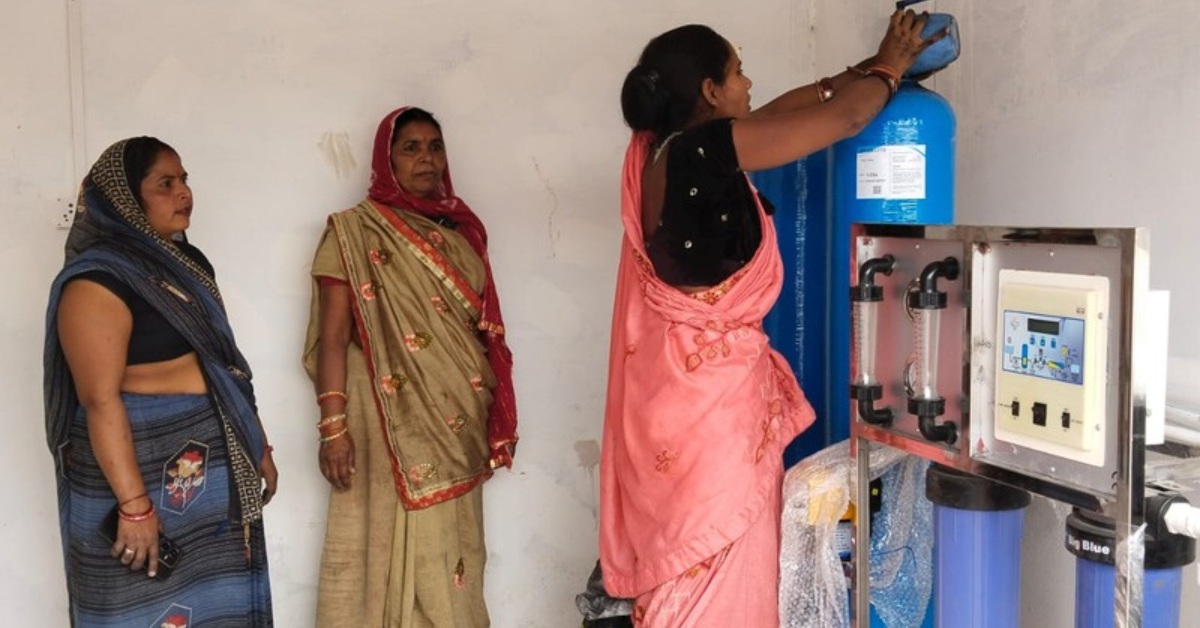12400 Lives Touched, 37 Tonnes of CO2 Saved: How Women Are Powering India’s Green Economy
This article is sponsored by Development Alternatives.
Meenu Devi, a 36-year-old entrepreneur from Sikhar, Mirzapur, Uttar Pradesh, transitioned from a diesel-powered flour mill to a solar-powered one through Development Alternatives’ Urja Mandala Initiative.
Originally from Lucknow, Meenu’s family relocated to rural Mirzapur, where they faced challenges such as limited resources, financial instability, and inadequate infrastructure.
The shift to a solar-powered flour mill drastically reduced her operational costs by 70 percent, increased her income by 30 percent, and eliminated diesel emissions, enhancing both business efficiency and environmental sustainability.
 Meenu Devi, from Sikhar, Mirzapur, reduced costs by 70 percent and grew her income by 30 percent after switching her flour mill to solar — proving how women-led green enterprises can power both prosperity and sustainability.
Meenu Devi, from Sikhar, Mirzapur, reduced costs by 70 percent and grew her income by 30 percent after switching her flour mill to solar — proving how women-led green enterprises can power both prosperity and sustainability.
Meenu plans to further expand her business by setting up a solar-powered stitching unit, aiming to create more jobs and empower local women with advanced skills. Her journey showcases the potential of women-led green enterprises in promoting economic growth and climate solutions.
Madhuri from Gumla, Jharkhand, observed how frequent power outages hindered daily life and local businesses in her community. For many businesses, diesel-powered generators had become an expensive necessity.
 Madhuri emerged as a grassroots energy leader, mobilising local entrepreneurs to join the Urja Mandala initiative and driving a community shift from diesel dependence to clean, solar-powered livelihoods.
Madhuri emerged as a grassroots energy leader, mobilising local entrepreneurs to join the Urja Mandala initiative and driving a community shift from diesel dependence to clean, solar-powered livelihoods.
The rising diesel prices and the ongoing costs of operating generators cut into profits, adding to financial strain. Many businesses struggled to maintain operations, and the lack of reliable power limited their potential to grow and innovate, holding back economic progress.
Under the Urja Mandala initiative, Madhuri became a proactive advocate for renewable energy, inspiring her community to adopt solar solutions, reducing reliance on costly diesel generators.
A legacy of innovation and sustainability
Research has shown that when women lead businesses, they are more likely to set ambitious climate goals and achieve superior environmental and economic outcomes, underlining the crucial link between gender equity and effective climate action (World Bank, 2022).
Envisioning an economy where millions of ‘job seekers’ become ‘job makers’, while prioritising social inclusion, environmental sustainability, and economic growth, Development Alternatives (DA) has formulated several initiatives like Urja Mandala, Safe Mobility, and Shakti Kendra.
Urja Mandala: women collectives for energy solutions and climate action
DA’s Urja Mandala Model, supported by The Hongkong and Shanghai Banking Corporation (HSBC), provides renewable energy solutions to rural communities through a decentralised solar mini-grid model that places women collectives at the centre of energy management.
These collectives are responsible for collecting, managing, and distributing clean, affordable energy to local entrepreneurs, such as small-scale manufacturers, artisans, and shop owners. In many parts of India, gender equality and technology are often perceived as incompatible.
 Women-led and community-owned, the Urja Mandala solar mini-grids are powering rural enterprises, cutting carbon emissions, and creating livelihoods — placing women at the heart of rural India’s just and inclusive energy transition.
Women-led and community-owned, the Urja Mandala solar mini-grids are powering rural enterprises, cutting carbon emissions, and creating livelihoods — placing women at the heart of rural India’s just and inclusive energy transition.
To dismantle this misconception, Urja Mandala actively involves women collectives from the outset in energy operations, customer acquisition, and financial management. This green and inclusive approach, integrating technical training, leadership roles, and knowledge sharing, creates a paradigm shift.
By positioning women as leaders in energy management, Urja Mandala not only empowers communities to thrive economically but also reduces reliance on fossil fuels, enhancing resilience to climate challenges. To date, 117 core enterprises have been set up under this initiative, benefiting 12,408 individuals in Uttar Pradesh and Jharkhand.
The initiative has led to the mitigation of 37 tonnes of CO2 so far and is estimated to mitigate over 100 tonnes of CO2 every year through six Urja Mandalas established in the two states.
Safe Mobility: safe transportation and livelihood
With the Safe Mobility initiative, Development Alternatives aims to promote safe, sustainable mobility for women while creating economic opportunities through green transportation solutions.
In partnership with local women’s groups such as Cluster Level Federations (CLFs), Uttar Pradesh State Rural Livelihood Mission (UPSRLM), and converging existing government initiatives like Lakhpati Didi and Aajeevika Grameen Express Yojana (AGEY), they are facilitating the formation of women-run e-rickshaw enterprises. Women are not only trained in driving but also receive support in business management and financial literacy.
“Our goal is to empower women to take charge of addressing the challenge of safe mobility, a barrier that limits their potential in society. We envision a future where young girls feel free and secure to pursue education, and women have the independence to earn their livelihoods,” says Kanika Verma, Associate Vice President, Development Alternatives.
Shakti Kendra: bringing power to women
Shakti Kendra was set up by Development Alternatives as a model to showcase how women collectives with more agency on local resources can ensure green and inclusive growth. Shakti Kendra, which literally means Energy/Power Centre, is a high-growth manufacturing unit in which multiple businesses are run by women, powered by Solar Energy.
This whole setup is owned by a women’s collective called Shakti Samudays, who run this entire infrastructure and has also invested in it. The initiative is being funded by Bank of America National Association, with Development Alternatives as the partner and Uttar Pradesh State Rural Livelihood Mission (UPSRLM) providing further support.
 Solar-powered women-led Shakti Kendra in Jhansi houses oil expelling, slipper making, and disposable plate units — generating Rs 3-4 lakh in annual revenue, creating jobs for 10-15 women.
Solar-powered women-led Shakti Kendra in Jhansi houses oil expelling, slipper making, and disposable plate units — generating Rs 3-4 lakh in annual revenue, creating jobs for 10-15 women.
These manufacturing enterprises are powered by 10-15 kW solar power and have an annual revenue of Rs 3-4 lakh. The plant has created jobs for 10-15 women who are members of a local CLF (Cluster Level Federation).
These kendras include production units such as oil expeller unit, chappal (slipper) manufacturing, groundnut thrasher unit, pelletisation unit, etc. It also houses Shakti Marts, which are service-based and include units for sustainable building materials, RO water purification, etc. These together are developed to envision the development of service-based rural malls in future.
Recognising women
We live in a time marked by interconnected crises — environmental degradation, extreme weather events, unemployment, and widening social and economic inequities — that threaten global stability. A shift toward a greener economy is critical to addressing the climate crisis and promoting sustainable development.
This transformation requires innovative, inclusive solutions that create jobs and promote environmental stewardship. At the heart of this transition are women-led enterprises, which play a vital role in driving change by creating green jobs, reducing carbon emissions, and building resilience.
Despite their essential contributions, women often remain overlooked in traditional economic models, perpetuating a gender gap that hampers sustainable progress. Emerging sectors like renewable energy and green technology are still largely male-dominated, leaving women underrepresented in leadership, employment, and entrepreneurship.
However, the green economy offers a unique opportunity to empower women, especially in rural and underserved communities, by enabling them to lead enterprises that address both climate challenges and economic disparities.
In India, for example, women-led green enterprises are becoming powerful agents of change, improving resilience in areas facing environmental degradation, water scarcity, and pollution. Organisations like Development Alternatives (DA) work alongside vulnerable communities, empowering women through skill development and economic opportunities, which ripple out to improve education, healthcare, and household well-being.
Empowering women not only uplifts individuals but also benefits entire communities, breaking cycles of intergenerational poverty and creating lasting, positive change.
Key partnerships and collaborative efforts
Development Alternatives’ green entrepreneurial ecosystems provide underserved groups with the resources, opportunities, and market linkages they need to succeed. Their approach to social innovation focuses on identifying systemic challenges, designing solutions tailored to local contexts, and enabling collaboration among stakeholders.
Their community-based model centres on collective action, knowledge empowerment, and building leadership skills to create sustainable, inclusive, and green enterprises. By leveraging partnerships and facilitating co-creation, they ensure scalable and sustainable impact.
Edited by Khushi Arora
News